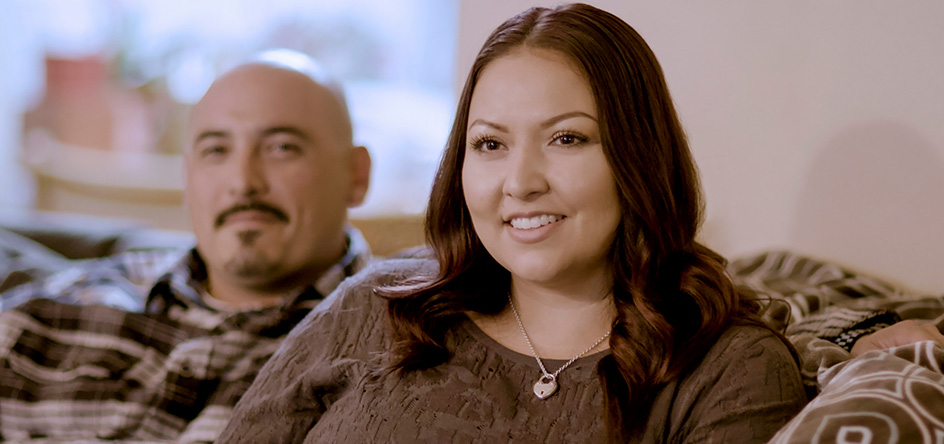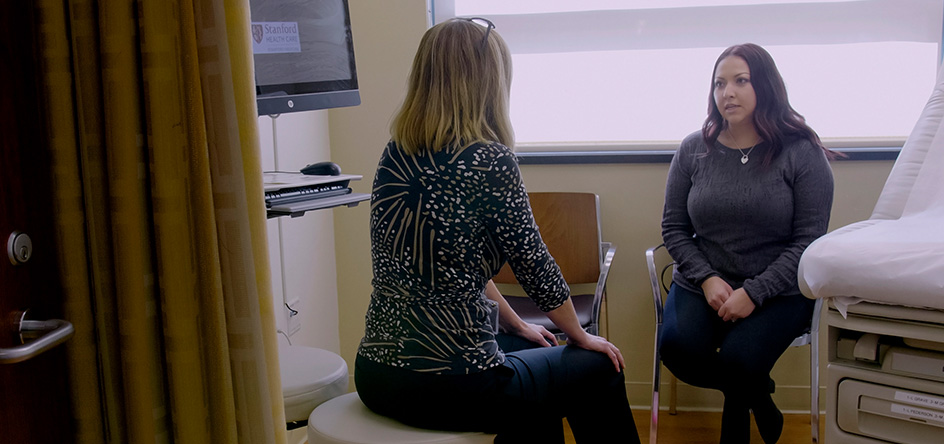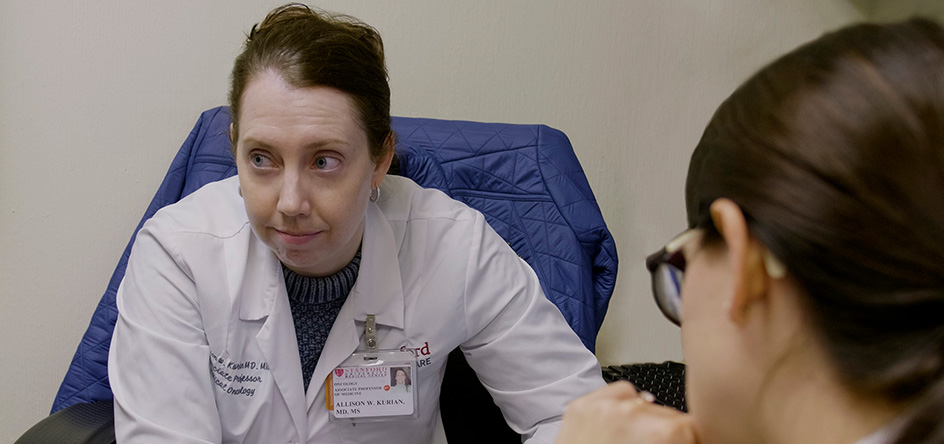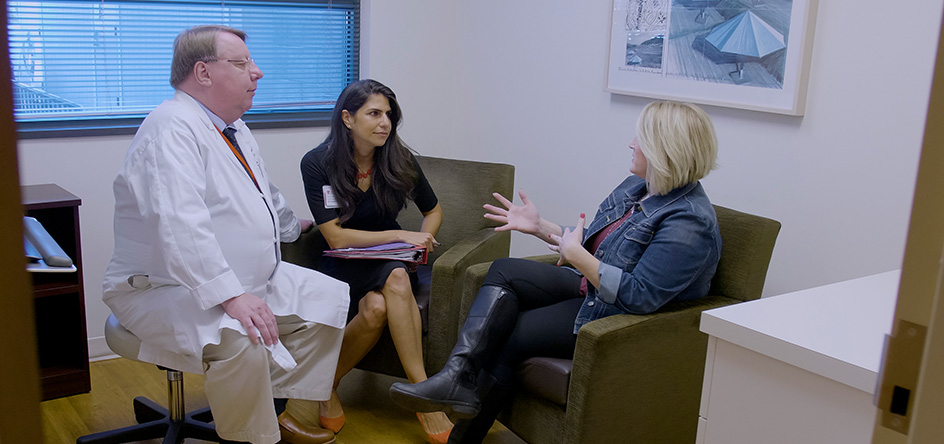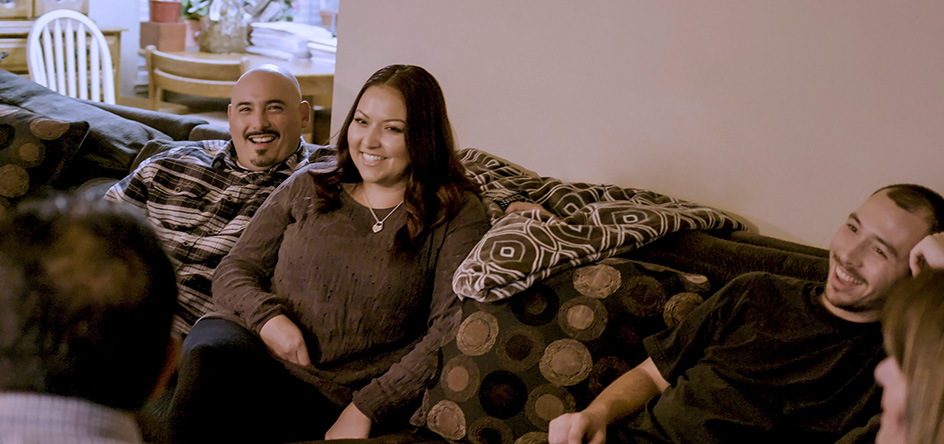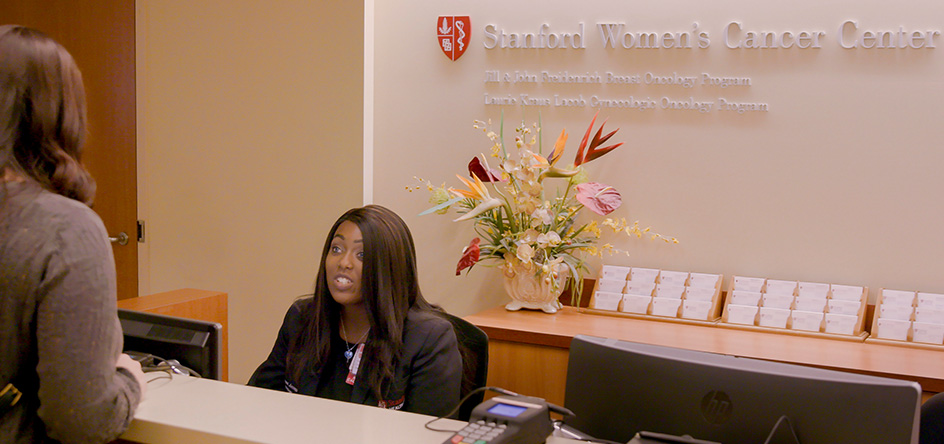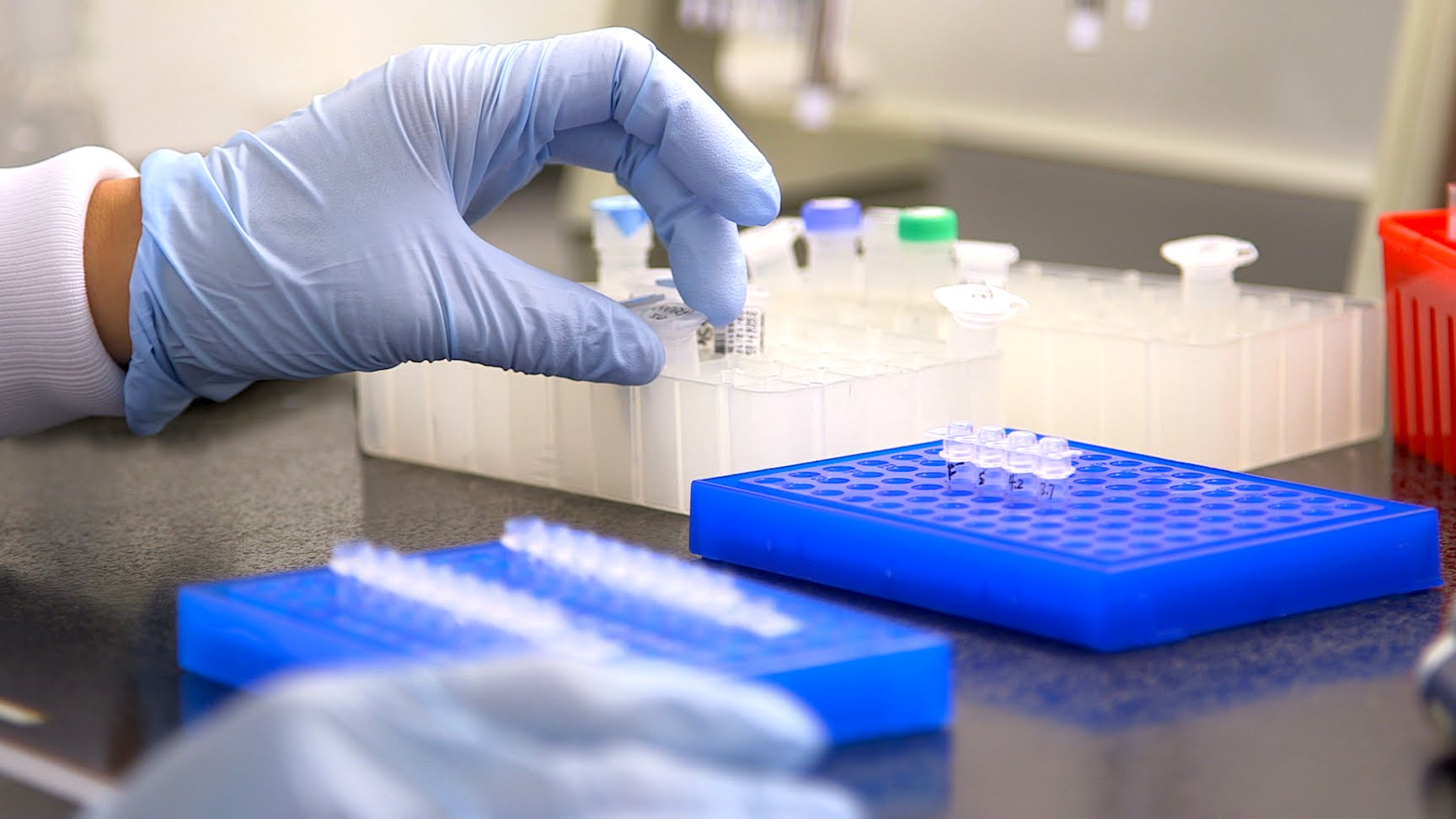Cancer Genetics Program
Part of Stanford Medicine Cancer Center
Leaders in Assessing and Managing Hereditary Cancer Risk
If cancer seems to run in your family, a risk assessment can provide key information. Our nationally recognized expertise ensures relevant, up-to-date guidance, while personal attention helps you understand the findings and weigh your options.
900 Blake Wilbur Drive
Palo Alto,
CA
94304
Phone: 650-498-6000
What We Offer You for Cancer Genetics
- Specialized expertise from one of the nation’s first programs for inherited cancer risk, including in the breasts, ovaries, colon, and rectum. Go to Conditions Treated
- Complete risk assessment and management, including genetic testing, cancer prevention, early detection, and family help. Go to Risk Assessment and Management
- Clinical trial opportunities for everyone we help, with studies to customize treatment, enhance testing, improve screening, and perfect care. Go to Clinical Trials
- Team approach, with experienced, certified genetic counselors, renowned doctors, and dedicated nurse practitioners helping you make informed choices. Go to Your Care Team
- Full support, including social and emotional care, support groups, fertility preservation, and embryo screening. Go to Support Services
- Ease of access, with convenient clinics in Palo Alto, San Jose, and Pleasanton, each with a team member who speaks English and Spanish. Go to Accessing Care
Assessing genetic risk can identify methods to prevent cancer, lead to earlier diagnosis, or guide cancer treatment for you and your family.
As a national referral center, we have experience with a range of inherited risk, including rare genetic changes and mutations in recently identified genes. Our team brings together experts in genetics, oncology, and other fields to interpret complex genetic information, so you receive deeper insight more quickly.
Cancers with Genetic Risk
Cancer usually develops for reasons unrelated to your family. Hereditary changes in DNA can play a role in some cases, though, through missing, duplicated, or miscoded genes. While these mutations do not always cause problems, they increase your risk for certain cancers:
Cancer Syndromes
Sometimes an inherited mutation or a set of mutations can cause multiple cancer types in the same family, across generations. These syndromes, their known gene associations, and the conditions they cause include:
- Birt-Hogg-Dubé (BHD) syndrome: FLCN gene — skin and kidney tumors and lung problems
- DICER1 syndrome: DICER1 gene — lung, kidney, ovary, and thyroid tumors
- Familial adenomatous polyposis (FAP): APC gene — colorectal polyps and cancer
- Gorlin syndrome, or nevoid basal cell carcinoma syndrome (NBCCS): PTCH1 gene — basal cell carcinoma skin cancer, jaw tumors, and others
- Hereditary breast cancer: BRCA1, BRCA2, TP53, PTEN, CDH1, ATM, CHEK2, PALB2, and other genes — breast cancer; also ovarian, fallopian tube, peritoneal, prostate, and pancreatic cancers for BRCA genes; and also other cancer types depending on the gene
- Hereditary diffuse gastric cancer (HDGC): CDH1 gene — stomach cancer, lobular breast cancer, prostate cancer, and colorectal cancer
- Hereditary leiomyomatosis and renal cell carcinoma (HLRCC): FH gene — skin and uterus tumors and kidney cancer
- Hereditary ovarian cancer: BRCA1, BRCA2, BRIP1, RAD501C, RAD51D, the Lynch genes, and others — ovarian cancer; also other cancer types depending on the gene
- Hereditary papillary renal cell carcinoma (HPRCC): MET gene — kidney cancer
- Hereditary paraganglioma-pheochromocytoma (PGL/PCC): SDHD, SDHAF2, SDHC, SDHA, SDHB, and other genes — tumors in ganglia nerve cell bunches
- Juvenile polyposis syndrome (JPS): BMPR1A and SMAD4 genes — gastrointestinal polyps
- Li-Fraumeni syndrome (LFS): TP53 gene — breast, bone, soft tissue, and adrenal gland cancers, leukemia, and brain tumors
- Lynch syndrome, or hereditary nonpolyposis colorectal cancer (HNPCC): MLH1, MSH2, MSH6, PMS2, and EPCAM genes — colorectal, uterine, ovarian, stomach, small intestine, liver, gallbladder, upper urinary tract, brain, and skin cancers
- Multiple endocrine neoplasia type 1 (MEN1): MEN1 gene — endocrine gland and intestinal tumors
- Multiple endocrine neoplasia type 2 (MEN2): RET gene — medullary thyroid cancer and parathyroid, adrenal gland, and nerve tissue tumors
- MUTYH-associated polyposis (MAP): MUTYH gene — colorectal polyps and cancer
- Neurofibromatosis type 2 (NF2): NF2 gene — nerve tumors, including acoustic neuroma
- Peutz-Jeghers syndrome (PJS): STK11 gene, also known as the LKB1 gene — breast, colorectal, pancreatic, stomach, testicular, ovarian, lung, and cervical cancers
- PTEN hamartoma tumor syndrome (PHTS): PTEN gene — various benign tumors, melanoma, and breast, thyroid, kidney, endometrial, and colorectal cancers
- Schwannomatosis: SMARCB1 and LZTR1 genes — nerve tumors
- Von Hippel-Lindau (VHL) syndrome: VHL gene — blood vessel and adrenal gland tumors and pancreatic and kidney cancers
Your Stanford team follows the latest evidence from the field of cancer genetics, with many of the program’s discoveries guiding national care. Our doctors write national guidelines on when to test for mutations and how best to manage risk. They continue to identify genetic changes that can cause cancer.
INNOVATION HIGHLIGHTS
- BRCA decision tool: Women worldwide use our free decision tool to learn more about their options for BRCA1 and BRCA2 gene mutations. These mutations can cause breast, ovarian, and other cancers.
- Stomach cancer expertise: We offer leading expertise in the CDH1 gene mutation tied to stomach cancer. People from around the world seek our help when testing unexpectedly finds this rare mutation.
Comprehensive Risk Assessment
Our board-certified, cancer-focused genetic counselors guide you through each step of the process and help you reach highly personal decisions. You can also consult with top doctors whose published work continues to improve care. Learn about our genetic testing and risk assessment services
Personalized consultations
Our consultations help people who survived cancer, need treatment, or suspect their genetic predisposition is higher. We examine personal and family medical histories, consult the latest research, and run computer models. When appropriate, we discuss the benefits of genetic testing, as well as its limits and possible impact.
Panel genetic testing
Instead of testing single genes, top programs now use next-generation sequencing to analyze dozens at once. We adopted this panel testing early on and proved its effectiveness at helping people with genetic risk. We lead the way in testing for lesser-known genes tied to cancer, especially breast cancer.
Coordinated family care
If you have children, we coordinate services with the genetic counselor at Stanford Children’s Health. If you want to become pregnant, we can coordinate with our Fertility Preservation Program to screen embryos for inherited cancer risk during in vitro fertilization (IVF). The fertility program can also help women with a BRCA gene mutation and higher ovarian cancer risk preserve their eggs.
Please contact us or speak with your doctor if you meet any of these criteria:
You have a diagnosis of:
- Breast, uterine, colon, prostate, pancreatic, or other cancer before age 46
- Triple-negative breast cancer
- Breast, prostate, or pancreatic cancer at any age, with Ashkenazi Jewish heritage
Your family has:
- Known mutation in a cancer risk gene
- Member diagnosed with cancer at an early age
- Multiple members diagnosed with cancer, including different types
Treating Cancer and Managing Risk
We provide personalized options, helping you weigh both the benefits and the drawbacks. Our recommendations depend on your risk level and the mutations identified, if any. We offer specialized expertise to devise a plan when the answer is not obvious or national guidelines do not yet exist. We also partner with other Stanford clinics to connect you with the best specialist for managing your specific cancer risk.
Surveillance and Medications
If you face a higher risk for cancer, we can recommend tests and scans to detect disease at earlier stages, when it is more curable. We offer the latest techniques, working to refine and improve them. Medications can also lower your chances of developing cancer if an assessment places you at higher risk.
Prophylactic Surgery
While we recommend doing so only in certain cases, removing organs or tissue can protect your long-term health. Our surgeons’ expertise ensures safe and effective surgery, as well as fully supported recovery.
Family Support
We can care for additional family members with higher risk. If needed, we help them find specialists near them and supply the needed background information.
Cancer Treatment and Survival
Identifying inherited mutations can guide cancer treatment, including disease that has spread, or metastasized. Even if you have successfully completed treatment, knowing that you have a genetic mutation can help prevent a new cancer from developing.
Clinical Trials
Clinical trials for inherited cancer genetics look to improve the way risk is detected, presented, and managed. When appropriate, these studies may provide you with a chance to try the latest approaches.
Open trials refer to studies currently recruiting participants or that may recruit participants in the near future. Closed trials are not currently enrolling, but similar studies may open in the future.
Recent or ongoing research areas at Stanford include:
- Improved screening for ovarian and pancreatic cancer
- Better ways to handle the volume of genetic information now available
- Targeted therapy based on certain inherited genetic mutations
Open trials refer to studies currently recruiting participants or that may recruit participants in the near future. Closed trials are not currently enrolling, but similar studies may open in the future.
Your Cancer Genetics Care Team
Together, your Stanford team partners with you to provide tailored risk assessment, recommendations, and support. Team members explain what the findings and choices mean for you and your family and answer your questions. They help you decide which options best meet your needs.
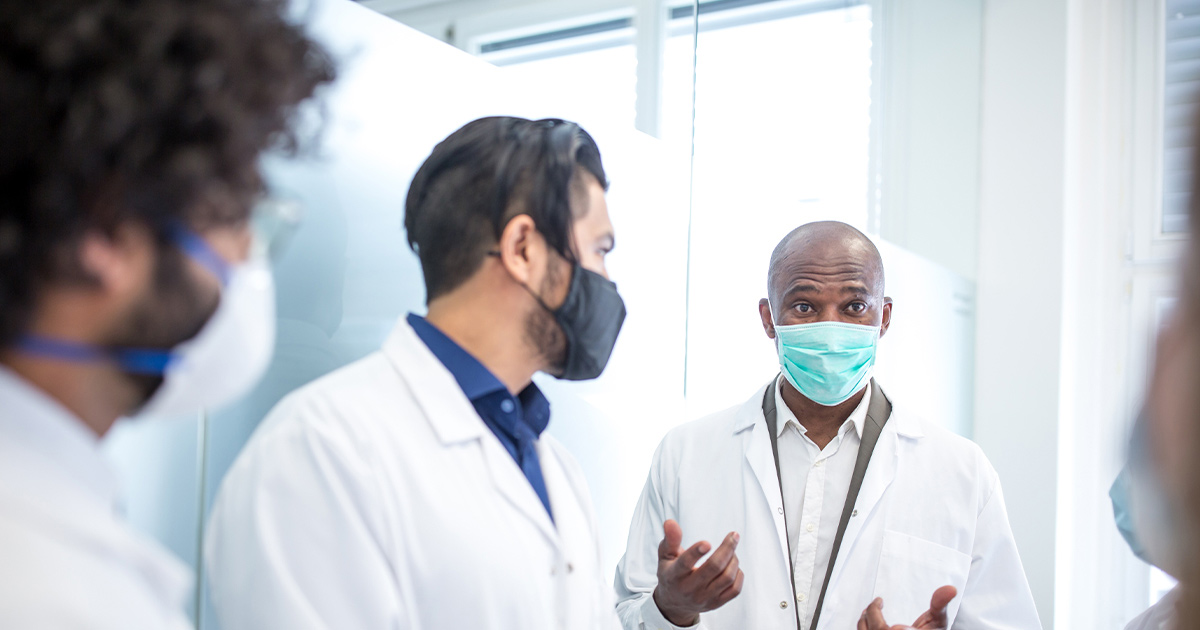
Your Clinicians
Genetic Counselors
The genetic counselors in the Cancer Genetics Program have special training in the science of cancer genetics and the best ways to work with you. They serve as your main point of contact during your initial consultation and follow-up visit. They assess family histories and test results and help you make decisions.
Our counselors are certified by the American Board of Genetic Counseling or the American Board of Medical Genetics, and licensed by the State of California.
GENETIC COUNSELORS









Medical Oncologist
Medical oncologists have specialized training in diagnosing and treating cancer using medications, including chemotherapy and biological, hormonal, and targeted therapy. Our team includes medical oncologists with expertise in cancer genetics. They order tests and help manage your care if you have a risky genetic change or a strong family history of cancer. They may also join your initial consultation.
View All {0} Medical OncologistsGastroenterologist
Gastroenterologists specialize in the care of digestive disorders. Our team includes a gastroenterologist trained in the genetics of cancers affecting the gastrointestinal tract, including the stomach and rectum.
View All {0} GastroenterologistsStanford is an Academic Medical Center, which is a type of hospital setting where doctors teach medical students as they progress through medical school and training. Stanford Medicine is a partnership between Stanford University School of Medicine and Stanford Health Care. Since Stanford is a teaching hospital, you can expect to meet many providers and providers in training.
- Attending Physician: a doctor who supervises doctors in training or in medical school
- Fellow: a doctor doing postgraduate level work and specializing in care of patients with cancer
- Resident: a doctor who has graduated from medical school and is in training (also called “residency”) here at Stanford. A resident is also called an intern
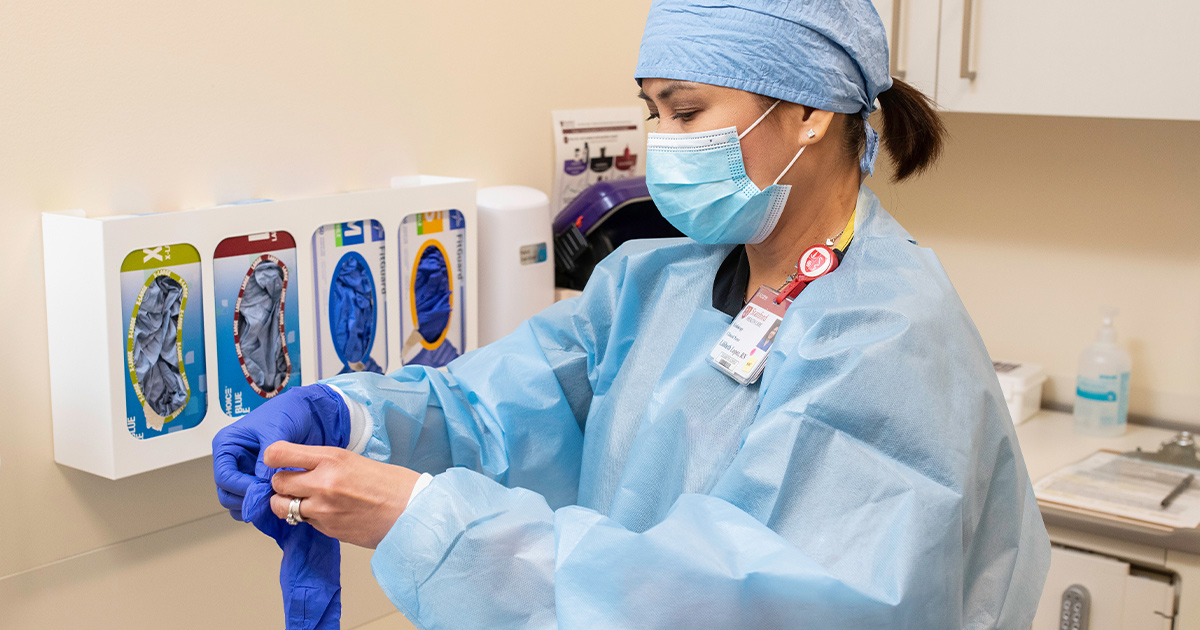
Extended Care Team
These specialists are nurse practitioners and physician assistants who work closely with your genetic counselor and oncologist to provide support and help with treatment.
Nurses, new patient coordinators, patient access representatives, and medical assistants coordinate your care with your breast cancer team. They guide you from your first contact through follow-up care and help you find counseling, financial, and other support services.
Care coordinators provide you with information and assistance prior to and during your appointment.
Medical Assistant
Medical assistants bring you to your exam room after you check in for your appointments. They take your vital signs before your doctor sees you.
New Patient Coordinator
Our coordinators contact you before your first appointment and help prepare you by providing the information you need to know and bring with you.
Patient Access Representative
Our patient access representatives greet you at the front desk and register you for your appointments.

Support Services
Cancer Care Services
As part of your care, we design a personalized wellness plan to support you and your family. With just one call to Cancer Care Services, you can speak with a specially trained nurse who can help assess your needs and connect you to the services that are right for you. Contact Cancer Care Services for your personal support plan, which could include:
- Case managers and social workers
- Financial counseling
- Integrative medicine
- Interpreter services
- Fertility preservation
- Spiritual care
- Stanford Health Library
- Stanford Cancer Survivorship Program
Support Groups
Support groups are available through the Stanford Cancer Supportive Care Program for specific diagnoses and through Bay Area Cancer Connections for people with inherited cancer risk
With three clinic locations, we make it easy to find the help you need for inherited cancer risk. We start with an initial evaluation, before asking you to return to discuss findings and recommendations.
- Convenience: We offer three locations, on our main Palo Alto campus, in South Bay (San Jose), and through Stanford Health Care Tri-Valley (Pleasanton). Each location has a team member who speaks English and Spanish.
- Insurance: Genetic counseling, genetic testing, and related services are often covered by insurance. We accept most insurance plans. The overall cost of genetic services has significantly declined over the years, helping to offset any out-of-pocket expenses you may have.
- Referrals: Some people come to our program through their doctors’ referrals, while others contact us directly. If you come by referral, we coordinate with your doctor and share updates.
- MyHealth: Our MyHealth system allows you to access your records and test results from home, as well as communicate with your doctors.
- BRCA decision tool: Learn about your options for managing cancer risk from BRCA1 and BRCA2 gene mutations using our free decision tool.
Frequently Asked Questions
We participate in a wide range of insurance plans. View the list of insurance plans accepted by Stanford Health Care
Have insurance or pre-authorization questions? The Patient Financial Clearance team is available Monday – Friday, 8 a.m. – 5 p.m., to answer your questions. Please call 650-724-4445 or 1-877-291-7335
When choosing a doctor, it’s important to consider the doctor’s clinical training, experience and expertise in a specialized area that matches your health care needs.
You can find the right Stanford doctor for you by using our doctor directory and filtering the results based on a medical category, specialty, or doctor’s last name. View our list of doctors
We offer a number of support services, including support groups, interpreter services, nutrition services, a health library, and a variety of classes and events. Learn more about our support services
Yes, Stanford Health Care offers financial assistance for patients who are uninsured or underinsured. Meet with one of our financial counselors to find the best approach to paying for your health care. Financial counselors are available Monday through Friday from 7:00 a.m. – 6:00 p.m. Learn more about financial assistance services
You can call the Cancer Genetics Program directly to schedule an appointment with one of our cancer genetics specialists. Call 650-498-6000 to make an appointment
You will also need to have the following information with you when you check in:
- Insurance card
- A form of payment for any co-pays or deductibles
- One form of photo ID:
- Valid state-issued driver’s license
- Valid state-issued ID card
- Valid passport
- Valid U.S. Military ID card
- Valid U.S. Permanent Resident Card
- Bring the completed form Pre-Visit Questionnaire
The Cancer Genetics Program is located at the following three locations:
Cancer Genetics Program in Palo Alto
Directions and Parking information for the Cancer Genetics Program in Palo Alto:
Cancer Genetics Program in Palo Alto
875 Blake Wilbur Drive
Palo Alto, CA 94304
Phone: 650-498-6000
Cancer Genetics Program in San Jose
Directions and Parking information for the Cancer Genetics Program in San Jose:
Cancer Genetics Program in San Jose
2589 Samaritan Drive
San Jose, CA 95124
Phone: 408-426-4900
Cancer Genetics Program in Pleasanton
Directions and Parking information for the Cancer Genetics Program in Pleasanton:
5565 W. Las Positas Blvd
Suite 320
Pleasanton, CA 94588
408-426-4900
Please print, fill out, and return the Medical Record Release Form to your new patient coordinator. The medical release form is an authorization form for external facilities to release medical records to Stanford Health Care.
Always feel free to bring someone with you to your appointments. A family member or friend can help ask questions, remember the information your care team gives you, and provide support.
Write down your questions before your appointment and rank them in order of importance, beginning with the most important ones. If there isn’t enough time to have all your questions answered during your appointment, ask your doctor who you can speak with to get your other questions answered.
You have multiple options when it comes to paying your bill.
- Pay Online:
- You can log in to MyHealth or the MyHealth mobile app to see and pay your bill.
Already have an account but need help logging in?
Contact the MyHealth Help Desk
- You can also pay as a guest to pay your bill without logging in.
- Pay by mail:
- Stanford Health Care
P.O. Box 740715, Los Angeles, CA 90074-0715
Los Angeles, CA 90074-0715
- Stanford Health Care
- Pay by Phone:
- You can call our Patient Billing Customer Service Office
1-800-549-3720.
- You can call our Patient Billing Customer Service Office
For our latest business hours and for more information about billing, visit our Billing page.
We offer a number of support services, including support groups, interpreter services, nutrition services, a health library, and a variety of classes and events. Learn more about our support services
Please call our clinic receptionists at 650-498-6000. They are available Monday through Friday to help you reschedule or cancel your appointment.
To determine if a clinical trial is right for you, talk to your doctor. He or she can refer you to a research coordinator for more information on studies that may be right for your specific condition.
You can also find the guidelines for who can participate in a particular clinical trial online. However, it is best to work with your doctor to decide the right care approach for your needs.
View list of open Cancer Genetics clinical trials at Stanford
Many of our programs are available to international patients.
Our International Medicine Services team can help you find the right doctor, estimate medical costs, book travel, and get you information about Stanford programs and services.
Please call +1 650-723-8561 or email IMS@stanfordhealthcare.org to get started.
For Referring Physicians
PHYSICIAN HELPLINE
Fax: 650-320-9443
Monday–Friday, 8 a.m.–5 p.m.
Stanford Health Care provides comprehensive services to refer and track patients, as well as the latest information and news for physicians and office staff. For help with all referral needs and questions, visit Referral Information.
You may also submit a web referral or complete a referral form and fax it to 650-320-9443 or email the Referral Center at ReferralCenter@stanfordhealthcare.org.
HOW TO REFER
Fax or email a referral form with supporting documentation to 650-320-9443 or ReferralCenter@stanfordhealthcare.org.
To request an appointment with one of our cancer genetics specialists, call 650-498-6000.






